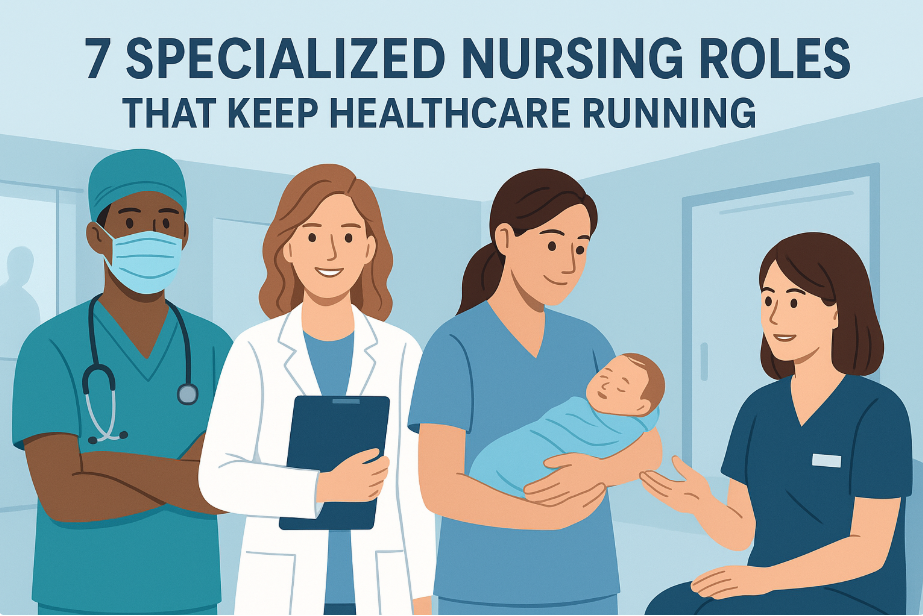
Walk into any hospital and you’ll see that doctors aren’t the only ones making decisions or calming patients. Some of the most vital hands and voices belong to nurses. They’re not background “helpers” but specialists with knowledge that shapes care in ways most people overlook.
Surgery wouldn’t be safe without anesthesia managed, premature babies wouldn’t thrive without constant monitoring, and even a routine colonoscopy needs skilled guidance. Choosing an endoscopy nurse as a career path or other specialized roles isn’t just about a title; it’s about holding healthcare together. Here are seven nursing roles every team depends on.
Nurse Anesthetist: The Backbone of Pain-Free Procedures
Think back to the last time you, or someone you care about, faced surgery. The fear wasn’t just about the outcome, was it? The thought of pain can weigh heavily on patients. Nurse anesthetists carry that burden for them.
These nurses handle anesthesia with incredible precision. They monitor breathing, heart rate, and countless other details that most of us wouldn’t even think about while under the knife. Surgeons might get the spotlight, but the truth is, procedures wouldn’t be possible without the quiet assurance of a nurse anesthetist standing by.
For patients, their presence means safety and comfort. For doctors, it frees them to focus completely on the operation at hand. It’s one of those roles you might only notice when something goes wrong, yet their whole purpose is making sure it doesn’t.
Nurse Practitioner: Bridging the Gap Between Nurses and Doctors
If you’ve ever walked into a clinic expecting to see a doctor but were instead seen by a nurse practitioner (NP), you may have been surprised by how thorough and approachable the visit felt. NPs often step in where doctors are scarce or overloaded, diagnosing illnesses, prescribing medications, and following up on treatments.
The best part? They often have more time to listen. Patients open up more, ask questions they might otherwise hold back, and walk away feeling heard. That alone can change the outcome of care.
From a healthcare team’s perspective, NPs expand capacity in a way that keeps clinics and hospitals running smoothly. In some rural communities, they’re the primary providers. Without them, entire areas would face dangerously long waits for even basic care.
Clinical Nurse Specialist: The Problem-Solver Every Team Needs
Every workplace has that one person others turn to when things get complicated. In hospitals, that person is often a clinical nurse specialist (CNS).
They’re not just experts in their field, be it oncology, pediatrics, or intensive care; they’re the ones designing systems that keep problems from snowballing. Say a hospital keeps seeing post-surgical infections. A CNS might step in, examine practices, and roll out changes that bring those rates down.
For patients, the results are visible even if the role isn’t. Faster recoveries, fewer complications, and care that feels more coordinated. For teams, CNSs bring a kind of stability: a sense that someone is watching the bigger picture while others focus on immediate needs.
Nurse Educator: Shaping the Next Generation of Nurses
Here’s a question: where do skilled nurses come from? Every confident nurse on the floor was once a student, shaped by someone who knew how to teach not just the facts, but the judgment and instincts that can’t be found in textbooks. That someone is a nurse educator.
They teach in universities, yes, but they also train on-site in hospitals, ensuring staff adapt to new equipment, treatments, or protocols. Their influence is often invisible to patients, but it’s everywhere. When your nurse knows exactly how to adjust a ventilator or respond calmly to a crisis, chances are a nurse educator built that foundation.
It’s not flashy work, but it’s essential. Without educators, the flow of capable nurses into the healthcare system would slow, and in a field where shortages are already common, that would be devastating.
For More: https://xuzpost.com/
Endoscopy Nurse: Specialists Behind Life-Saving Screenings
Routine screenings don’t always feel like lifesaving moments, but anyone who’s had a cancer detected early through a colonoscopy knows otherwise. Endoscopy nurses are the quiet force behind these procedures.
They prep patients, manage equipment, and stay vigilant during recovery. If you’ve ever been nervous before a scope, chances are it was the endoscopy nurse who calmed you down, explained what would happen, and checked in afterward to make sure you were okay.
What makes this role stand out is how much impact it carries for something so “routine.” Detecting disease early often decides whether treatment is straightforward or overwhelming. For healthcare teams, these nurses keep essential diagnostic services moving. For patients, they may literally hold the key to longer, healthier lives.
Neonatal Nurse: Guardians of the Tiniest Patients
Few jobs carry the emotional weight of neonatal nursing. Picture a baby so small they can fit in your hand, surrounded by machines that measure every heartbeat and breath. That’s the world neonatal nurses step into every day.
Their role blends technical expertise with deep compassion. They know how to run advanced monitors and administer life-saving treatments, but they also spend hours reassuring exhausted parents, explaining what every beep means, and celebrating even the smallest signs of progress.
Healthcare teams rely on them not only for their skills but for the humanity they bring to some of the most fragile moments. For families, neonatal nurses often become anchors, steady voices in a storm of uncertainty.
Psychiatric-Mental Health Nurse: Supporting Both Mind and Body
Physical health often gets center stage, but we’re finally starting to admit what many have always known: mental health is just as important. Psychiatric-mental health nurses (PMHNs) stand at this intersection, addressing conditions like anxiety, depression, or schizophrenia while understanding how they tie into a person’s physical well-being.
For patients, talking with a nurse often feels less intimidating than a formal session with a psychiatrist. That comfort can open doors to treatment that might otherwise stay shut.
For healthcare systems, PMHNs reduce pressure on emergency departments by offering consistent, ongoing care. They also help teams approach patients more fully, not just treating symptoms, but understanding the emotional weight behind them.
Conclusion
When you step back, you see a pattern: healthcare thrives not because of one profession, but because of a tapestry of roles woven together. Nurse anesthetists keep surgeries safe, neonatal nurses give fragile lives a chance, and psychiatric-mental health nurses remind us that healing isn’t only physical.
These seven roles show us something important. Specialized nurses aren’t just filling in gaps; they’re expanding what’s possible in healthcare. Patients get care that’s safer, faster, and more compassionate. Teams run more smoothly. Families walk away with trust.
If you’re reading this as someone considering nursing, or even just curious about the paths available, maybe one of these roles caught your eye. And if you’re ready to take the first step, you can apply for healthcare jobs online today, because the next story of recovery might just start with you.






